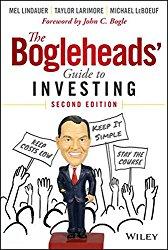I found a great tip today, reading through the Bogleheads' Guide to investing - our book-of-the-month, concerning mutual fund fees. There are the fees that you know about and that are listed on the prospectus such as loads and the expense ratio. But there are also hidden fees that really aren't listed anywhere. These are fees related to trading such as brokerage commissions and losses due to the spread paid when trading shares.


Join us in reading our Book-of-the-Month: The Bogleheads' Guide to Investing

Brokerage commissions are fees paid to a broker when your fund buys or sells shares. These might be fairly small on a percentage basis, but they can add up over a year and remove half a point to a point of return. These may also pay for things like travel and other expenses when the brokerage house is also the creator of the mutual fund. Really things like travel should be included in the expense ratio, but they are not always.
Understanding the spread is a little more difficult. When you buy or sell a stock, there are two prices, called the bid and the ask prices. The bid price is what someone is willing to buy the shares for, while the ask is what someone is willing to sell the shares for. The bid price will always be below the ask price by some amount, usually around 1/8th to 1/4 point, but sometimes it can be quite a bit bigger. There are people called "market makers" who trade the shares for you when you put in an order. If you are buying shares, what they will typically do is buy the shares from someone at the bid price, and then sell them to you at the ask price. If you wanted to turn around immediately and sell the shares, assuming the price hadn't changed, you would then only be able to sell at the bid price, since the market maker would buy the shares from you at the bid price and sell them at the ask price. The effect is that you lose 1/4 to 1/2 point each time you buy or sell stocks or bonds.
So a mutual fund will be paying commissions and also losing money to the spread as they trade shares in the fund. Over time this has the effect of reducing the return you receive from the fund. If you are holding shares in a taxable account, you might also need to pay taxes on capital gains realized by the fund during the year, as well as interest and dividends earned.
You can't eliminate these hidden fees, but you can reduce them. Here's how:
- Check out the turn-over rate for a fund. This should be listed in the prospectus. A turn-over of 100% means that on average the full value of the fund is bought and sold each year. The more trading is done, the higher the hidden fees. Turn-overs of less than 25% are great.
- Buy index funds and ETFs. Passively traded funds buy and sell less often than actively manged funds, so holding these funds will result in lower fees and higher returns. You also will pay less in management fees since the amount of management involved is minimal.
- Buy and hold individual stocks for long periods of time. If you skip the mutual funds altogether and buy and hold individual stocks and bonds for long periods of time, you won't have management fees and you can minimize trading fees. If you trade yourself a lot, however, you're defeating the purpose since you'll then be paying the spread, paying commissions, and generating taxes. You are also taking a risk that stocks you pick won't perform as well as the market by buying individual stocks.
Have a question? Please leave it in a comment. Follow me on Twitter to get news about new articles and find out what I'm investing in. @SmallIvy_SI
Disclaimer: This blog is not meant to give financial planning or tax advice. It gives general information on investment strategy, picking stocks, and generally managing money to build wealth. It is not a solicitation to buy or sell stocks or any security. Financial planning advice should be sought from a certified financial planner, which the author is not. Tax advice should be sought from a CPA. All investments involve risk and the reader as urged to consider risks carefully and seek the advice of experts if needed before investing.

